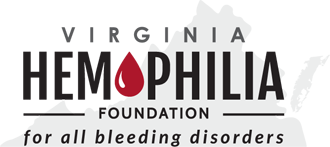Mental Health America (MHA) and their affiliates across the country observe May as Mental Health Month and this year’s theme is “Look Around, Look Within” which asks us to consider every part of our environment and its effect on our mental health and well-being. In the bleeding disorders community there are many internal and external factors that can contribute to a decrease in mental well-being and an increase in stress and depression, including chronic joint pain, frequent medical visits, and ready access to needed services.
VHF is dedicated to helping individuals live a mentally healthy life and we believe that taking care of the mind and spirit is as important as taking care of the body. One of the ways we do this is to offer programs that support creating bonds with your community while connecting with the outdoors. Spending time in nature is linked to many positive mental health outcomes – lower stress, better mood, and reduced risk of developing a mental health condition. One of the greatest benefits you get from nature is connection, which is linked to a better connection to self, community, and purpose. Time in nature benefits personal growth, self-esteem, emotional regulation, and social skills and when children connect with nature, they’re more imaginative and independent, and they feel more connected to the peers they’re playing with and other living things (Fact Sheet MHM 2023 – The Outdoors and Nature.)
We hope you join us for one of our outdoor community events this summer and go here for a printable calendar from MHA filled with creative ways to make the world around you work for your mental health and to stay engaged throughout Mental Health Month!
For more bleeding disorder specific mental health resources visit the National Hemophilia Foundation’s Mental Health webpage and the Hemophilia Federation of America’s Mental Health Support page.
If you or someone you care about is experiencing an immediate crisis or having thoughts of self-harm or harming others, then seek immediate assistance by calling 9-1-1, calling your healthcare provider, going to the nearest emergency department, or calling 988 Suicide & Crisis Lifeline Free and confidential support for people in distress. Prevention and crisis resources are available for you or your loved ones through a national network of local crisis centers (call 988 or 1-800-273-TALK (8255) for English, 1-888-628-9454 for Spanish)
